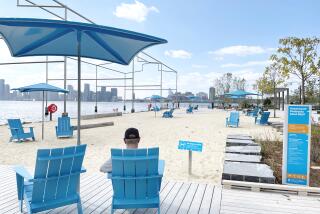Manhattan Beach Wants Land It Gave Guard in ’48
Manhattan Beach officials, fighting a proposal by the California National Guard to sell its 4.4-acre armory property to the highest bidder, say the guard should give the surplus land to the city, for the expansion of an adjoining park and equipment yard.
Officials for both the city and the National Guard said this week that they have just begun to discuss the future of the property at 36th Place and Bell Avenue in the north end of the city. It has been used for more than 40 years as a storage facility for military equipment and as a National Guard training post.
National Guard spokesman Maj. Michael Ritz said this week that the guard is considering selling some of its Southern California properties, including the Manhattan Beach armory, to raise money to modernize other facilities.
“There has been no definite decision as to the sale,” Ritz said. “That will depend on negotiations between the city fathers and the National Guard.”
Because the state Legislature must approve the sale of the property, city officials have enlisted the support of state Sen. Robert Beverly (R-Manhattan Beach), who said Thursday that he is “generally supportive of the city’s position.”
“After all, they gave the property to the National Guard,” Beverly said.
Guard Wants to Move
But, Beverly predicted, the National Guard will keep the Manhattan Beach property if it is not able to make money on the sale. The guard needs the money from the sale to move to another facility, Beverly said.
Ritz said there are no plans to sell National Guard armories in other South Bay communities, including those in Gardena, Inglewood, San Pedro and Torrance.
Ritz said the guard hopes to recoup its “substantial capital investment” in buildings and equipment on the Manhattan Beach property, which adjoins Sand Dune Park. State officials have appraised the property at $5 million.
Manhattan Beach officials said that if the National Guard leaves, the city should get the property free.
The Manhattan Beach City Council voted in 1948 to give 11.4 acres of land to the California National Guard for a training and storage facility.
In 1963, the National Guard said it did not need six of the acres and returned the land to the city, said Manhattan Beach City Atty. Carl Newton. The state Legislature approved the transfer of the land.
“The state Legislature recognized that it was appropriate to restore that property to the city,” Newton said. “That property was not needed for an armory. The same recognition should occur this time. . . . We see no reason the state should gain a windfall from this property.”
In 1970, the city gained one additional acre from the National Guard when the two sides agreed to redraw a property line. This left the guard with its current 4.4 acres.
Newton said he does not know if the deed to the National Guard property contains a clause requiring the state organization to return the land to the city if it is no longer needed for an armory.
But, even without such a clause, Newton argues, the land would rightfully belong to the city. The National Guard recognized the city’s dominion in 1963 and 1970 when it returned the excess land, Newton said.
City’s Needs
Manhattan Beach could use one acre of the National Guard property to expand an adjoining city equipment yard that is badly overcrowded, said City Manager David Thompson. The remaining 3.4 acres could be added to Sand Dune Park, Thompson said.
The City Council would have the final say over how to use the land, he said.
Homeowners who live near the property probably would welcome closure of the National Guard facility, which is occasionally rented for parties and wedding receptions.
“There are very narrow streets, and all these kids just pour out after dances,” said Betty Steib, a vice president of the Manhattan Beach Property Owners Assn. “They are loud, and they drop beer bottles everywhere.”
Such complaints led the city last year to adopt a policy requiring gatherings in private halls to end at 11 p.m. on weeknights and at midnight on weekends. The new law, which took effect Jan. 17, also requires groups to obtain permits to hold events at the armory and private meeting halls.
More to Read
Sign up for Essential California
The most important California stories and recommendations in your inbox every morning.
You may occasionally receive promotional content from the Los Angeles Times.










